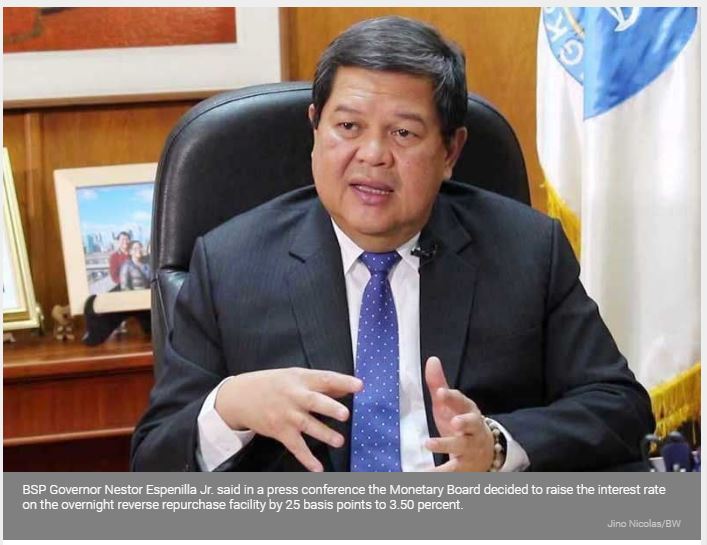Philippines: Interest rates raised anew on inflation risks
MANILA, Philippines — The Bangko Sentral ng Pilipinas (BSP) yesterday delivered back-to-back rate hikes as inflation expectations remain elevated for this year as well as the risk of possible second-round effects from ongoing price pressures.
BSP Governor Nestor Espenilla Jr. said in a press conference the Monetary Board decided to raise the interest rate on the overnight reverse repurchase facility by 25 basis points to 3.50 percent.
The interest rates on the overnight deposit and lending facilities were likewise raised to three percent and four percent, respectively.
“In deciding to raise the BSP’s policy interest rate anew, the Monetary Board noted that inflation expectations remain elevated for 2018 and that the risk of possible second-round effects from ongoing price pressures argued for follow-through monetary policy action,” Espenilla said.
The BSP chief said the policy action enables the central bank to reinforce its signal to safeguard macroeconomic stability in an environment of rising commodity prices and ongoing normalization of monetary policy in advanced economies including the US and Europe.
Last May 10, the Monetary Board delivered its first rate hike in more than three years. It lifted benchmark rates by 25 basis points.
Espenilla said the BSP reiterates its support for carefully coordinated efforts with other government agencies in implementing non-monetary measures to mitigate the impact of supply-side factors on inflation.
Although inflation expectations remain within the two to four percent target range for 2019, Espenilla said elevated expectations for 2018 highlight the risk posed by sustained price pressures on future wage and price outcomes.
“2018 basically reflects what we have earlier described to be supply-side factors that cause inflation to spike. There have been deve-lopments since then. And as we are forecasting right now, our best expectations is that inflation will come back to target by 2019. Nonetheless this is a forecast, and forecasts have uncertainty around it,” Espenilla said.
He said upside risks continue to dominate the inflation outlook, even as various measures of core inflation continue to rise.
According to Espenilla, the impact of international oil and commodity price movements on overall inflation is expected to be stronger due to strong demand from consumers.
The Monetary Board also emphasized the BSP’s continued vigilance against developments, including excessive peso volatility that could affect the outlook for inflation.
Espenilla said monetary authorities continue to see more volatility in the exchange rate that potentially adds to the dynamics on inflation. The peso yesterday shed four centavos to close at 53.8 to $1 from Tuesday’s 53.44 to $1.
“It is still a fairly complex environment and there are uncertainties and what the BSP is signaling to the market is that first and foremost, we actually put a lot of focus on hitting our inflation target. This year, seems like it is no longer possible but definitely we would like to hit our target next year,” Espenilla said.
The BSP chief said the central bank is prepared to take further policy action as needed to achieve its price and financial stability objectives.
“That is a statement that basically reflects our continued watchfulness. We will continue to monitor the data flow and see whether what we have done so far, two policy rate hikes, is sufficient to secure our return to target range by next year,” Espenilla said.
BSP Deputy Governor Diwa Guinigundo said the Monetary Board decided to lower its inflation forecasts to 4.5 percent this year and to 3.3 percent next year.
Guinigundo said inflation would remain elevated this year due to sustained robustness in economic activity, the positive base effects from June to August this year because of the difference in oil assumptions and actual prices, the implementation of the minimum wage hike averaging P5 to P30 in October, as well as the imposition of the P2.50 per additional excise tax on tobacco starting July.
“Based on the monthly path of inflation we expect the peak to happen in the third quarter. This is much earlier compared to the previous projection. I think this is due to the fact that the momentum of inflation appears to be slowing down,” Guinigundo said.
Source: https://www.philstar.com/business/2018/06/21/1826383/interest-rates-raised-anew-inflation-risks#uKxRIor74x8xd68g.99


 Thailand
Thailand




